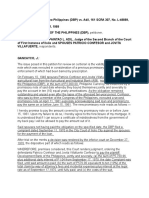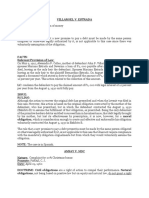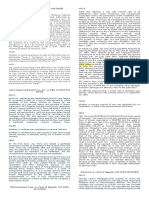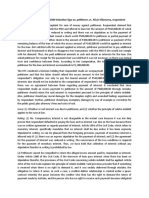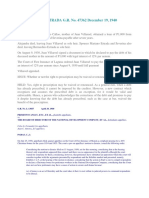DBP vs. Adil
DBP vs. Adil
Uploaded by
RileyCopyright:
Available Formats
DBP vs. Adil
DBP vs. Adil
Uploaded by
RileyOriginal Title
Copyright
Available Formats
Share this document
Did you find this document useful?
Is this content inappropriate?
Copyright:
Available Formats
DBP vs. Adil
DBP vs. Adil
Uploaded by
RileyCopyright:
Available Formats
Development Bank of the Philippines (DBP) v. Adil, Confesor and Villafuerte, et al., G.R. No.
L-48889, 11 May 1989.
19MAR
[GANCAYCO, J.]
FACTS: On February 10, 1940 spouses Patricio Confesor and Jovita Villafuerte obtained an agricultural loan from the
Agricultural and Industrial Bank (AIB), now the Development of the Philippines (DBP), in the sum of P2,000.00, Philippine
Currency, as evidenced by a promissory note of said date whereby they bound themselves jointly and severally to pay
the account in ten (10) equal yearly amortizations. As the obligation remained outstanding and unpaid even after the
lapse of the aforesaid ten-year period, Confesor, who was by then a member of the Congress of the Philippines,
executed a second promissory note on April 11, 1961 expressly acknowledging said loan and promising to pay the same
on or before June 15, 1961. The trial court ordered the spouses to pay the loan but this was reversed on appeal.
ISSUE#1: Does prescription operate to discharge a debt even if it there was acknowledgment of the debtor?
ISSUE#2: Is the conjugal partnership of Confesor and Villafuerte bound by the execution of the second promissory note?
HELD#1: NO.
This is not a mere case of acknowledgment of a debt that has prescribed but a new promise to pay the debt. The
consideration of the new promissory note is the pre-existing obligation under the first promissory note. The statutory
limitation bars the remedy but does not discharge the debt. A new express promise to pay a debt barred … will take the
case from the operation of the statute of limitations as this proceeds upon the ground that as a statutory limitation
merely bars the remedy and does not discharge the debt, there is something more than a mere moral obligation to
support a promise, to wit a – pre-existing debt which is a sufficient consideration for the new the new promise; upon
this sufficient consideration constitutes, in fact, a new cause of action.
HELD#2: YES.
Under Article 165 of the Civil Code, the husband is the administrator of the conjugal partnership. As such administrator,
all debts and obligations contracted by the husband for the benefit of the conjugal partnership, are chargeable to the
conjugal partnership. No doubt, in this case, respondent Confesor signed the second promissory note for the benefit of
the conjugal partnership. Hence the conjugal partnership is liable for this obligation.
You might also like
- Development Bank of The Philippines (DBP) v. Adil, Confesor and Villafuerte, Et Al., G.R. No. L-48889, 11 May 1989.Document1 pageDevelopment Bank of The Philippines (DBP) v. Adil, Confesor and Villafuerte, Et Al., G.R. No. L-48889, 11 May 1989.Maria Isabella MirallesNo ratings yet
- 2 DB v. ADILDocument2 pages2 DB v. ADILJay CezarNo ratings yet
- 03 DBP vs. ConfessorDocument2 pages03 DBP vs. Confessorbile_driven_opusNo ratings yet
- G.R. No. L-48889 - Development Bank of The Philippines v. Adil PDFDocument4 pagesG.R. No. L-48889 - Development Bank of The Philippines v. Adil PDFFranco AguiluzNo ratings yet
- DBP vs. ConfessorDocument7 pagesDBP vs. ConfessorMACNo ratings yet
- 4 DBP Vs AdilDocument2 pages4 DBP Vs AdilJessa Lo100% (1)
- DBP v. CONFESORDocument1 pageDBP v. CONFESORDaniela SandraNo ratings yet
- Caps Obli Salo FIRST DIVISIONDocument4 pagesCaps Obli Salo FIRST DIVISIONLawardCapsNo ratings yet
- Art. 1112. Persons With Capacity To Alienate Property May Renounce Prescription Already Obtained, But Not The Right To Prescribe in The FutureDocument2 pagesArt. 1112. Persons With Capacity To Alienate Property May Renounce Prescription Already Obtained, But Not The Right To Prescribe in The Futurepedz2511No ratings yet
- DEVELOPMENT BANK OF THE PHILIPPINES (DBP) V ADILDocument1 pageDEVELOPMENT BANK OF THE PHILIPPINES (DBP) V ADILAlfaria Ayan CharpangNo ratings yet
- DBP v. ADIL DigestDocument2 pagesDBP v. ADIL DigestJustineNo ratings yet
- Villaroel vs. EstradaDocument9 pagesVillaroel vs. EstradaMitchayNo ratings yet
- DBP vs. AdilDocument2 pagesDBP vs. AdilM Grazielle Egenias100% (1)
- Metrobank vs. RosalesDocument3 pagesMetrobank vs. RosalesTheodore0176No ratings yet
- Oblicon 69 DBP Vs AdilDocument5 pagesOblicon 69 DBP Vs AdilZhadlerNo ratings yet
- DBP Vs AdilDocument2 pagesDBP Vs AdilMaica MagbitangNo ratings yet
- Civrev2 Cases SyllabusDocument367 pagesCivrev2 Cases SyllabusHannaSalatanNo ratings yet
- ObliCon Case Digest - DBP vs. ConfesorDocument2 pagesObliCon Case Digest - DBP vs. ConfesorNilfpe SalcedoNo ratings yet
- DPB vs. Adil 161 SCRA 307Document1 pageDPB vs. Adil 161 SCRA 307Jonnel GohilNo ratings yet
- G.R. No. L-48889, May 11, 1989, DBP v. Confessor, 161 SCRA 307 (1988) - ObliCon-CDDocument2 pagesG.R. No. L-48889, May 11, 1989, DBP v. Confessor, 161 SCRA 307 (1988) - ObliCon-CDMarnil MagaraoNo ratings yet
- Development Bank of The Philippines v. Judge Adil, Et Al. (161 SCRA 307, 1989)Document2 pagesDevelopment Bank of The Philippines v. Judge Adil, Et Al. (161 SCRA 307, 1989)Earvin James AtienzaNo ratings yet
- CIVIL LAW REVIEW 2017-2018': Villaroel V. EstradaDocument109 pagesCIVIL LAW REVIEW 2017-2018': Villaroel V. EstradaMadzGabiolaNo ratings yet
- DBP v. Confessor, 161 SCRA 307 (1988)Document5 pagesDBP v. Confessor, 161 SCRA 307 (1988)Berns100% (1)
- DBP Vs AdilDocument7 pagesDBP Vs AdilThina ChiiNo ratings yet
- DBP v. ConfessorDocument4 pagesDBP v. Confessordes_0212No ratings yet
- DBP v. Confesor G.R. No. 48889Document1 pageDBP v. Confesor G.R. No. 48889Rizchelle Sampang-ManaogNo ratings yet
- Civil Law Review 2 CasesDocument88 pagesCivil Law Review 2 CasesDan_Pelagio_5466No ratings yet
- OBLICON Case DigestDocument37 pagesOBLICON Case DigestMadzGabiolaNo ratings yet
- 003 DBP V ConfessorDocument2 pages003 DBP V ConfessorKeith Ivan Ong Meridores100% (2)
- 36 and 37Document5 pages36 and 37RossRaiderNo ratings yet
- DBP vs. ConfessorDocument3 pagesDBP vs. ConfessorMarife Tubilag ManejaNo ratings yet
- Credit Transactions June 23Document5 pagesCredit Transactions June 23Trent ChimingchoiNo ratings yet
- Digest Feb 1Document6 pagesDigest Feb 1johnkyleNo ratings yet
- Case DigestsDocument48 pagesCase DigestsHazel Reyes-AlcantaraNo ratings yet
- PNB vs. Luzon Surety Co., Inc. and CaDocument5 pagesPNB vs. Luzon Surety Co., Inc. and CaTrem GallenteNo ratings yet
- RACQUEL-SANTOS v. CA - G.R. No. 174986 - July 7, 2009Document82 pagesRACQUEL-SANTOS v. CA - G.R. No. 174986 - July 7, 2009Jhai Jhai DumsyyNo ratings yet
- When There Is No Agreement That The First Debtor Shall Be Released From Responsibility, Does Not Constitute A Novation, and The Creditor Can Still Enforce The Obligation Against The Original Debtor."Document4 pagesWhen There Is No Agreement That The First Debtor Shall Be Released From Responsibility, Does Not Constitute A Novation, and The Creditor Can Still Enforce The Obligation Against The Original Debtor."Jlyne TrlsNo ratings yet
- Credit Cases MAY 2Document69 pagesCredit Cases MAY 2Dana DNo ratings yet
- RCBC V Arro To PBTC v. TambutingDocument5 pagesRCBC V Arro To PBTC v. TambutingPeng ManiegoNo ratings yet
- Task Performance 1Document16 pagesTask Performance 1Shiella Mae Bendecio100% (1)
- 2 Lopez v. Court of AppealsDocument14 pages2 Lopez v. Court of AppealsKristoffer PepinoNo ratings yet
- CreditDocument44 pagesCreditJereca Ubando JubaNo ratings yet
- Case Digests 1st Meeting Credit TransDocument16 pagesCase Digests 1st Meeting Credit Transmichael jan de celisNo ratings yet
- Neral Banking LawsDocument5 pagesNeral Banking LawsBadronDimangadapNo ratings yet
- CREDIT TRANS - Syllabus-Guaranty-Surety - With CasesDocument10 pagesCREDIT TRANS - Syllabus-Guaranty-Surety - With CasesSarah Zabala-AtienzaNo ratings yet
- Atok Finance Corporation vs. Court of Appeals FactsDocument4 pagesAtok Finance Corporation vs. Court of Appeals FactsasdfghjkattNo ratings yet
- Inciong Vs CA DigestDocument4 pagesInciong Vs CA DigestAl Simbajon100% (1)
- BPI Investment Corp. v. Court of Appeals (2002)Document8 pagesBPI Investment Corp. v. Court of Appeals (2002)Alex FranciscoNo ratings yet
- Credit DigestDocument38 pagesCredit DigestKelvin ZabatNo ratings yet
- Villaroel v. Estrada, 71 Phil. 140Document33 pagesVillaroel v. Estrada, 71 Phil. 140Kian Mark LitadaNo ratings yet
- Government Service Insurance System, Petitioner, Court of Appeals and Mr. & Mrs. Isabelo R. Racho, RespondentsDocument5 pagesGovernment Service Insurance System, Petitioner, Court of Appeals and Mr. & Mrs. Isabelo R. Racho, RespondentsbarcelonnaNo ratings yet
- Oblicon Case DigestsDocument4 pagesOblicon Case DigestsFoxtrot AlphaNo ratings yet
- 1st BatchDocument7 pages1st BatchVan NessaNo ratings yet
- Civ 2 CasesDocument290 pagesCiv 2 CasesBediones JANo ratings yet
- 2 Asset Pool A) SPV-AMC), Inc. V Sps. BerrisDocument2 pages2 Asset Pool A) SPV-AMC), Inc. V Sps. Berrist7uyuytuNo ratings yet
- Saura Import and Export Co., Inc., V. DBP (Contract of Loan Being A Consensual Contract) FactsDocument4 pagesSaura Import and Export Co., Inc., V. DBP (Contract of Loan Being A Consensual Contract) FactsNatsu DragneelNo ratings yet
- Oblicon CasesDocument11 pagesOblicon CasesCess LazagaNo ratings yet
- Digested CasesDocument47 pagesDigested CasesIvy Paz100% (3)
- Case #141 Conchingyan Vs RB Surety and Insurance - Torres, Loida CDocument3 pagesCase #141 Conchingyan Vs RB Surety and Insurance - Torres, Loida CMark SakayNo ratings yet
- MARIANO V CaDocument1 pageMARIANO V CaRileyNo ratings yet
- People v. GonzalesDocument13 pagesPeople v. GonzalesRileyNo ratings yet
- People v. Wong ChengDocument4 pagesPeople v. Wong ChengRileyNo ratings yet
- Tenchavez v. EscanoDocument11 pagesTenchavez v. EscanoRileyNo ratings yet
- UDK No. 16838 Case Digest - Reyes 1BDocument1 pageUDK No. 16838 Case Digest - Reyes 1BRileyNo ratings yet
- Calisterio V CalisterioDocument5 pagesCalisterio V CalisterioRileyNo ratings yet
- Buccat Vs BuccatDocument2 pagesBuccat Vs BuccatRileyNo ratings yet
- Aquino Vs DelizoDocument4 pagesAquino Vs DelizoRileyNo ratings yet
- Laperal v. KatigbakDocument2 pagesLaperal v. KatigbakRileyNo ratings yet
- Catalan Vs CaDocument5 pagesCatalan Vs CaRileyNo ratings yet
- Canullas Vs FortunDocument2 pagesCanullas Vs FortunRileyNo ratings yet
- Antonio Vs ReyesDocument18 pagesAntonio Vs ReyesRileyNo ratings yet
- Veloso v. MatinezDocument2 pagesVeloso v. MatinezRileyNo ratings yet
- Wiegel Vs Simpio DyDocument2 pagesWiegel Vs Simpio DyRileyNo ratings yet
- Intro To Law - Civil - Common Handout-1Document2 pagesIntro To Law - Civil - Common Handout-1RileyNo ratings yet
- Tuason Vs Court of AppealsDocument7 pagesTuason Vs Court of AppealsRileyNo ratings yet
- Republic Vs AlbiosDocument8 pagesRepublic Vs AlbiosRileyNo ratings yet
- Republic Vs CatubagDocument10 pagesRepublic Vs CatubagRileyNo ratings yet
- Republic Vs DagdagDocument6 pagesRepublic Vs DagdagRileyNo ratings yet
- People Vs ZapataDocument3 pagesPeople Vs ZapataRiley100% (1)
- Republic Vs GranadaDocument9 pagesRepublic Vs GranadaRileyNo ratings yet
























